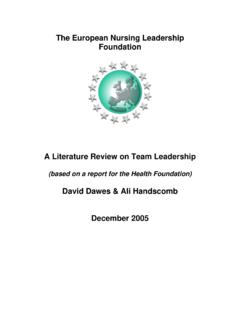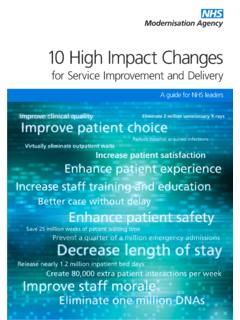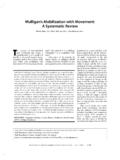Transcription of LEADERSHIP DEVELOPMENT A SYSTEMATIC …
1 LEADERSHIP DEVELOPMENT A SYSTEMATIC review OF THE LITERATURE A REPORT FOR THE NHS LEADERSHIP CENTRE By JEAN HARTLEY and BARRIE HINKSMAN Warwick Institute of Governance and Public Management Warwick Business School University of Warwick Coventry CV4 7AL July 2003 Professor Jean Hartley Tel: 024 7652 2311 Fax: 024 7652 4410 Email: NHS LEADERSHIP Centre: SYSTEMATIC review of LEADERSHIP DEVELOPMENT CONTENTS BACKGROUND AND INTRODUCTION 2 Aims of the research 2 The Warwick approach to the SYSTEMATIC review 3 Scoping the review 4 Data sources 5 Study selection 7
2 LEADERSHIP AND LEADERSHIP DEVELOPMENT 9 What is LEADERSHIP ? 9 What is LEADERSHIP DEVELOPMENT ? 13 Types of LEADERSHIP DEVELOPMENT 16 The extent of LEADERSHIP DEVELOPMENT 16 IDENTIFYING LEADERSHIP POTENTIAL FOR DEVELOPMENT 18 Competency frameworks 18 Appraisals 20 360 degree feedback 21
3 Politicking and opportunism 22 METHODS OF LEADERSHIP DEVELOPMENT AND 24 EVIDENCE TO SUPPORT EFFECTIVENESS Mentoring 24 Coaching 26 Networking 27 Action learning 29 Job challenge 30 Secondments 31 Succession planning 32 Formal programmes 32 Fast track cohorts 35 Organization DEVELOPMENT 36 Partnership working 38 EVALUATION OF THE IMPACT OF LEADERSHIP DEVELOPMENT
4 39 Models of LEADERSHIP and LEADERSHIP DEVELOPMENT 39 Levels and outcomes of LEADERSHIP DEVELOPMENT 41 Measurement issues 42 CONTEXTUAL INFLUENCES ON LEADERSHIP 44 DEVELOPMENT Private and public sector differences 44 US and UK differences 45 Organizational strategy and HRM strategy 45 CONCLUSIONS 47 Implications for NHS and NHSLC 47 The future of LEADERSHIP DEVELOPMENT 48 APPENDIX 49 REFERENCES 70 Warwick Institute of Governance and Public Management, Warwick Business School 1 NHS LEADERSHIP Centre.
5 SYSTEMATIC review of LEADERSHIP DEVELOPMENT BACKGROUND AND INTRODUCTION Aims of the research The NHS LEADERSHIP Centre commissioned Warwick Institute of Governance and Public Management to produce a SYSTEMATIC literature review of LEADERSHIP DEVELOPMENT to support the LEADERSHIP Centre s thinking on designing and evaluating LEADERSHIP DEVELOPMENT activities for the NHS. This review has aimed to produce: 1. a summary of the research produced from across the NHS, public and private sectors identifying key themes, findings and areas of debate 2. a summary of the key learning methodologies associated with LEADERSHIP DEVELOPMENT and the research to support their use 3.
6 A summary of the key LEADERSHIP models underpinning LEADERSHIP DEVELOPMENT activities and the research to support their use 4. an outline of different approaches to LEADERSHIP DEVELOPMENT across the public and private sectors 5. a summary of different evaluation methodologies and models 6. outlines of the key literature associated with each topic area (author, title, date of publication, summary of key themes and findings, robustness of research, how to access) Warwick Institute of Governance and Public Management, Warwick Business School 2 NHS LEADERSHIP Centre: SYSTEMATIC review of LEADERSHIP DEVELOPMENT The Warwick approach to the SYSTEMATIC review SYSTEMATIC reviews were developed in the medical sciences as part of the search for a better evidence-base for policy making ( Health Technology Assessment, 2002) They aim to evaluate the main body of research within a particular field, often over a defined period.
7 They are seen to be more rigorous than literature reviews, which in the social sciences are often based on narrative and subjective judgements. It is harder to apply the existing medicine-based SYSTEMATIC review methodology outside the hard sciences but a number of social scientists have grappled with the challenges and are using a modified form of SYSTEMATIC review in the social sciences, management research and in social policy areas ( Tranfield, Denyer, and Smart, 2002; Boaz, Hayden and Bernard, 1999). SYSTEMATIC review has been described as replicable, scientific and transparent (Tranfield et al, 2002).
8 Meta-analysis is a subset of SYSTEMATIC review , which can be conducted where there is substantial quantitative evidence, but in the fields here has not been feasible. For the topic of LEADERSHIP DEVELOPMENT we have suggested that the review covers both quantitative and qualitative evidence. Therefore, narrative review and qualitative SYSTEMATIC review are important in this review . The elements of the review therefore consist of: 1. Scoping the framework of the SYSTEMATIC review ( what will be covered under LEADERSHIP DEVELOPMENT ). 2. Defining the area to be covered ( time period and types of document).
9 3. Defining the principal periodicals, journals and publications to be covered. 4. Significant conference papers, where available in written form. Warwick Institute of Governance and Public Management, Warwick Business School 3 NHS LEADERSHIP Centre: SYSTEMATIC review of LEADERSHIP DEVELOPMENT 5. Defining the quality of the evidence to be included in the review . Some writers suggest that there must be sufficient information to make the study replicable and also sufficiently robust. 6. The primary focus is on empirical studies but we have included significant theoretical/conceptual studies.
10 7. Setting out data extraction sheets for the SYSTEMATIC recording of information. Scoping the review The field of LEADERSHIP DEVELOPMENT has generated a large and growing body of literature. The initial stage of this study was to define and limit its scope by establishing clear parameters. We scoped the review to cover all types of organizations providing LEADERSHIP DEVELOPMENT , whether in the public or private sectors. We also defined the focus to address LEADERSHIP DEVELOPMENT rather than the wider field of LEADERSHIP (though we recognise that LEADERSHIP DEVELOPMENT is related to the type of LEADERSHIP model which underlies it).














